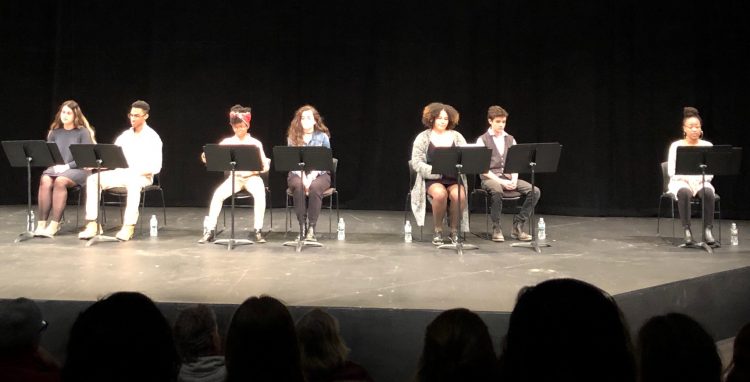‘Come My Beloved’ Takes Us To Detroit in the ’30s, ’70s and 2019

In a reading tonight of a play by Emma Weinstein, we got a glimpse, a slice of conversations from three different decades of life in Detroit Michigan. We listened in on three couples who had different takes on the Motor City, each from distinct eras of the city’s long history.
We meet Solomon and Sophie–she a jew with a thick Russian accent, he a black man facing the choices that men face when they are Communist sympathizing left-wing union organizers. Sophie says she’d die for the cause, but Solomon’s not so sure.
We switch gears, as the action is narrated by a woman sitting on the side of the stage.

We cut to a couple in the 1970s. Noah and Susan. Noah is a white guy who is afraid of the blacks around him in Detroit. She is a black woman watching how the city is witnessing white flight.
He is confused about why he is afraid, he’s honest, and clueless when it comes to how blacks live in the city.
He touches the wire, that third rail, as all of the characters do in this play. Good for them, it’s about time!
We cut to a lesbian couple smack dab in 2019. Out come the iPhones, Instagram, and messaging, and the God awful trappings that nobody can escape from, the connectedness, the beeps and the tweets, the Instagramming.
It’s a contrast to the other older generations, it feels too personal, the couple argues about many things but they again touch that third rail… Maya calls out her African American lover when she tries to play the race card. “You were born in Princeton!” she exclaims, mocking her hardship of being the only black girl in a sea of white privilege.
Playwright Emma Weinstein is completing a stint at the Yale School of Drama and is a young writer with a good understanding of Detroit. She keeps it all in the Motor City, local references and dated iconic places like the Rouge Ford plant and to the local paper, The Free Press.
Watching it as we did as a reading, without action, made it hard to really know what this play would be like presented as a play. One tip I’d give is to start with Maya and Julia, who are much more entertaining and interesting than the dogmatic Sophia, droning on about Marxist theories and her passion for the union cause versus Henry Ford.
The parts of the play where they lament the Brooklynization of Detroit, and the onslaught of the hip and of the performance artists, the dialogue really works. Other highlights were the reporting of the many reasons people are moving to Detroit, the breathless Buzzfeed reporter, encouraging more white twenty-somethings to come slum it in the city where homes costs just $5000.
It’s an interesting way of keeping it all to one topic, having three different eras represented by an ordinary Detroit couple.
There are three somewhat unnecessary moments like when the characters break out into song, Solomon suddenly Marvin Gaye’s ‘What’s Going On,’ why? After the opening song that Julia sang, which was a nice opening number, these were of questionable interest.
The other thing that would have helped is to have something in the program that tells the playwright’s vision so we would know the context of the play, which is fascinating. Detroit is a city that’s ripe for dramatic picking, and this play proves it.
UMass New Play Lab, Rand Theater at the UMass Fine Arts Center. March 28, 7:30 pm, March 30, 2 pm.
